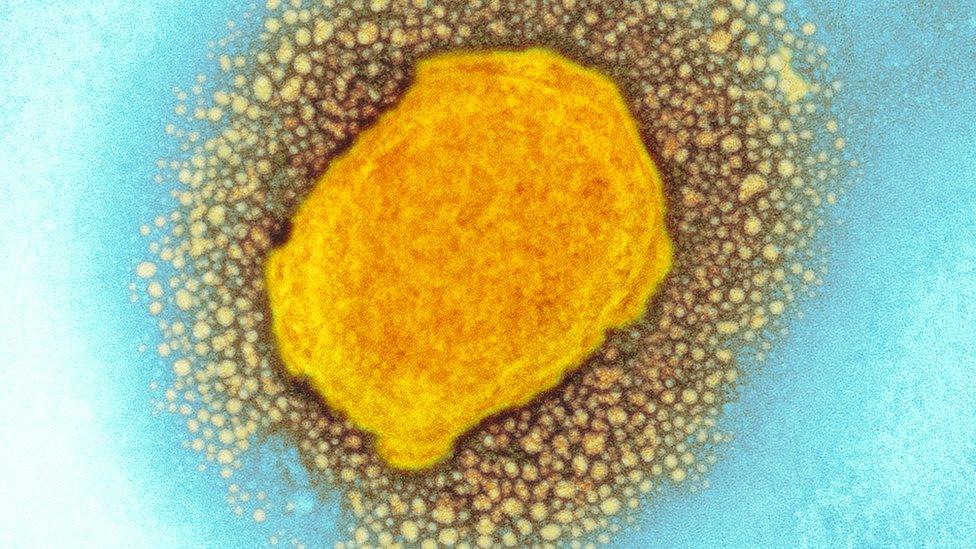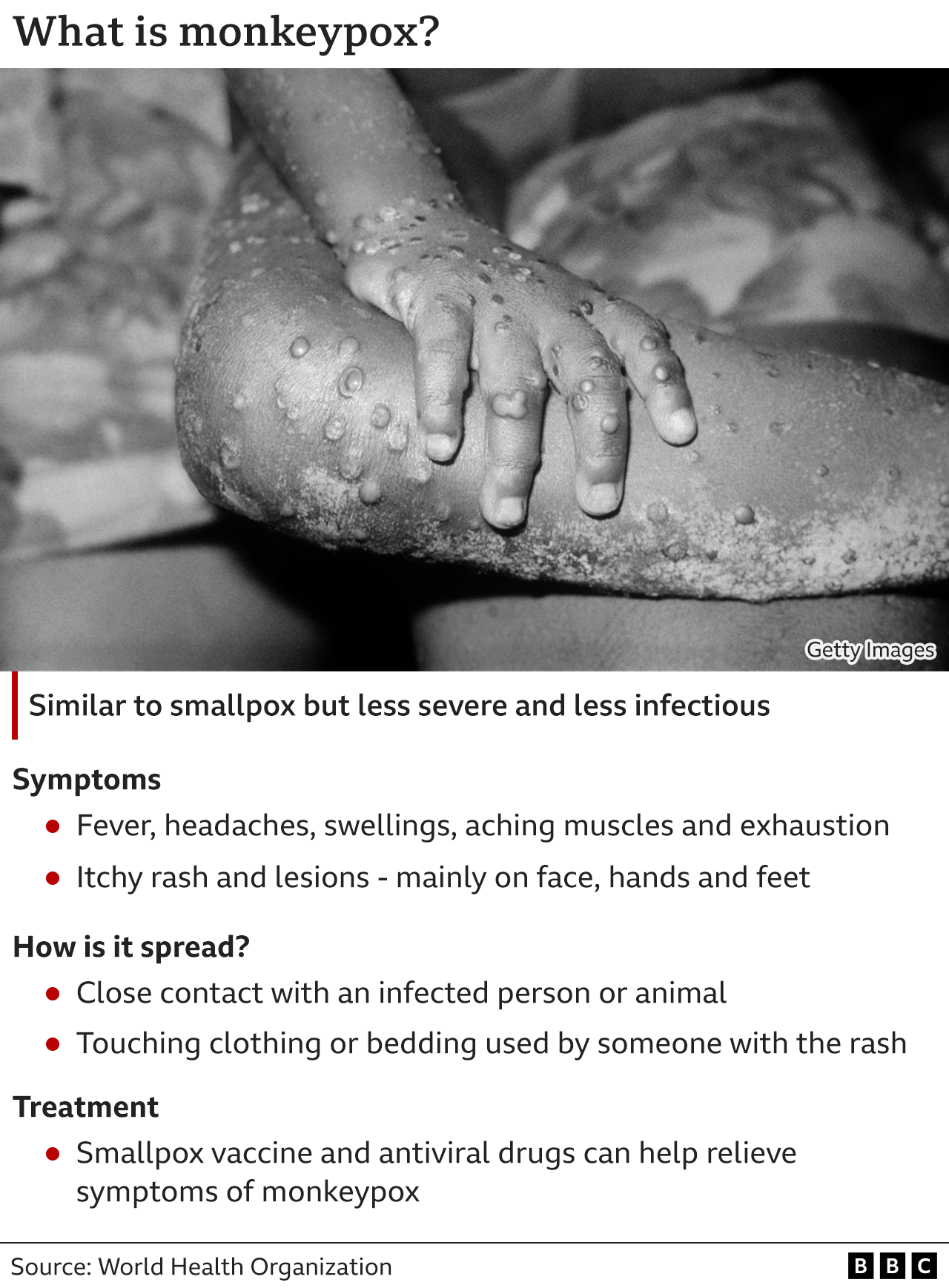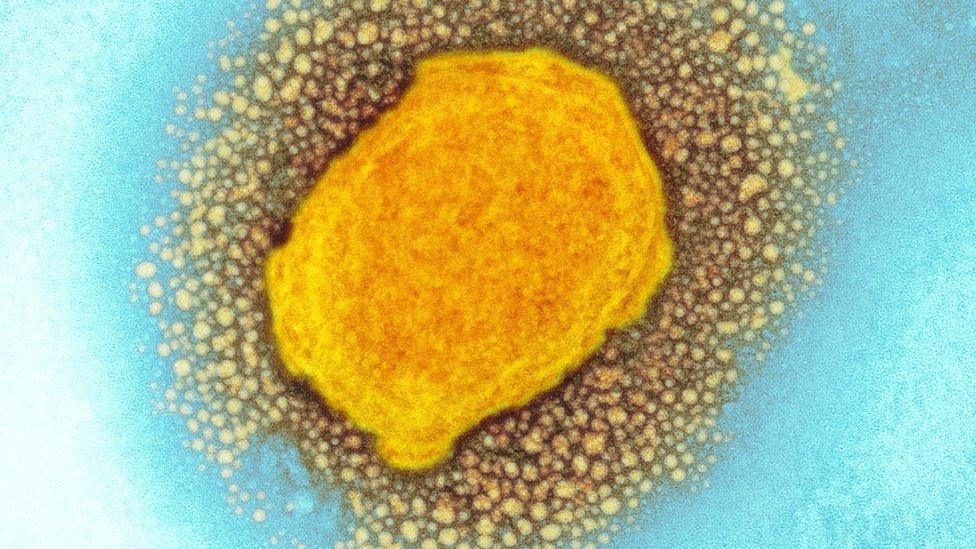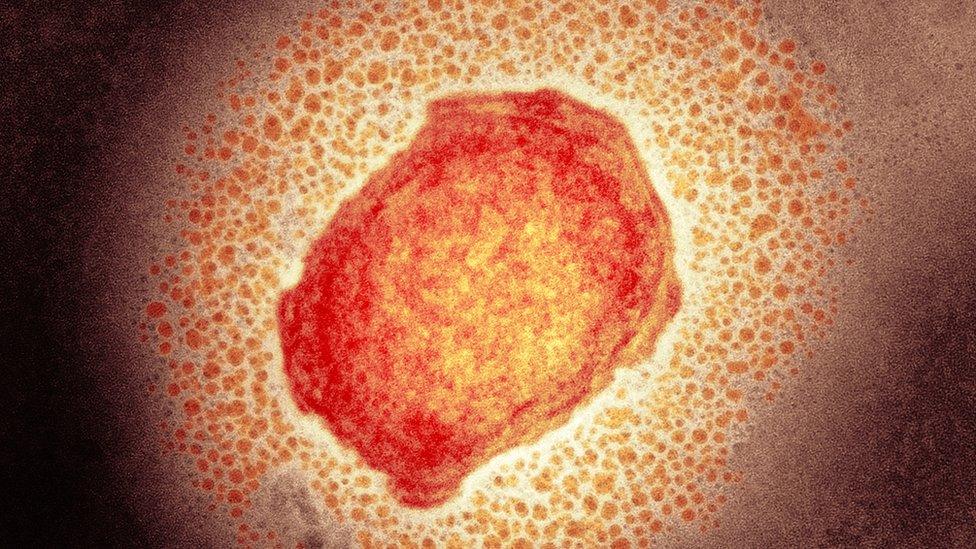Monkeypox: UK discovers 36 more cases
- Published

Symptoms include fever, headache, muscle aches, backache, swollen lymph nodes, chills and exhaustion
The UK Health Security Agency (UKHSA) says it has detected 36 additional cases of monkeypox in England.
Adding in a new case found in Scotland on Monday, it brings the total number of infections in the UK to 57.
The rare virus - which causes a rash and a fever - has been seen around the world in recent weeks, which is unusual.
Health experts stress that the overall risk remains low, and that the disease can be contained.
Northern Ireland's Public Health Agency, external and Public Health Wales, external each said they have had no confirmed cases.
Downing Street has said there are no plans to hold a meeting of the Cobra emergency committee over monkeypox, or to impose any travel bans.
Chelsea and Westminster Hospital in London has said "around 10" staff in its sexual health clinic are self-isolating at home after coming into close contact with a patient with monkeypox.
Dr Claire Dewsnap, president of the British Association for Sexual Health and HIV, told the BBC that "up to 10 staff" at a second sexual health clinic were also self-isolating. The location has not been revealed.
Clinics have now brought in stringent Personal Protective Equipment requirements when dealing with the virus.
About 100 confirmed cases have been recorded globally so far.
'Containable situation'
The World Health Organization's (WHO) emerging disease lead Maria Van Kerkhove said we should expect to see more in the coming days, but that we have the tools to stop the virus.
"This is a containable situation, particularly in the countries where we are seeing these outbreaks that are happening across Europe, in North America as well," she said.
"We can stop human-to-human transmission."
The virus does not usually spread easily between people, but it can be passed on through close person-to-person contact. That includes:
touching clothing, bedding or towels used by someone with the monkeypox rash
touching monkeypox skin blisters or scabs
the coughs or sneezes of a person with the monkeypox rash
Dr Susan Hopkins, from the UKHSA, urged people to be aware of any unusual rashes, or lesions and to contact a sexual health service if they have any symptoms.
"A notable proportion of recent cases in the UK and Europe have been found in gay and bisexual men so we are particularly encouraging these men to be alert to the symptoms," she said.
Andy Seale, an adviser to the WHO, said: "While we're seeing some cases in men, this is not a 'gay disease' as some people and social media have labelled it.
"It seems clear it's linked to close contact, whether through social contact or possibly sexual contact," he added in a social media session that was set up to answer questions from the public.
Anyone at the highest risk of having caught monkeypox - those who live with someone who has it, for example - will be asked to isolate at home for up to 21 days, in line with official guidelines., external
The government has confirmed that it has bought supplies of a smallpox vaccine, and this is being offered to identified close contacts of anyone diagnosed with monkeypox to reduce the risk of symptomatic infection and severe illness.

Most cases will be mild and get better within a few weeks.
If you become infected with monkeypox, it usually takes between five and 21 days for the first symptoms to appear.
They include fever, headache, muscle aches, backache, swollen lymph nodes, chills and exhaustion.
A rash can develop, often beginning on the face, then spreading to other parts of the body. The rash changes and goes through different stages - a bit like chicken pox - before finally forming a scab, which later falls off.

What are your questions about Monkeypox? You can get in touch by emailing haveyoursay@bbc.co.uk, external.
Please include a contact number if you are willing to speak to a BBC journalist. You can also get in touch in the following ways:
WhatsApp: +44 7756 165803, external
Tweet: @BBC_HaveYourSay, external
Or fill out the form below
Please read our terms & conditions and privacy policy
If you are reading this page and can't see the form you will need to visit the mobile version of the BBC website to submit your question or comment or you can email us at HaveYourSay@bbc.co.uk, external. Please include your name, age and location with any submission.

- Published21 May 2022

- Published21 May 2022

- Published5 August 2022
